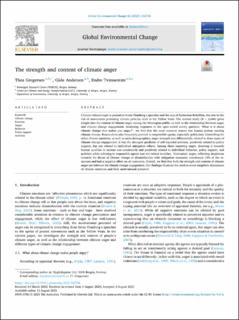The strength and content of climate anger
Journal article, Peer reviewed
Published version

Åpne
Permanent lenke
https://hdl.handle.net/11250/3084822Utgivelsesdato
2023Metadata
Vis full innførselSamlinger
- Department of Government [443]
- Registrations from Cristin [9489]
Sammendrag
Climate-related anger is present in Greta Thunberg’s speeches and the acts of Extinction Rebellion, but also in the rise of movements protesting climate policies, such as the Yellow Vests. The current study (N = 2,046) gives insight into the content of climate anger among the Norwegian public, as well as the relationship between anger and climate change engagement. Analyzing responses to the open-ended survey question “What is it about climate change that makes you angry?”, we find that the most common reason was human actions causing climate change. Respondents also frequently pointed to responsible agents, especially politicians. Controlling for other climate emotions, as well as socio-demographics, anger strength was differentially related to three types of climate change engagement; it was the strongest predictor of self-reported activism, positively related to policy support, but not related to individual mitigation efforts. Among those reporting anger, directing it towards human qualities or actions was consistently and positively related to individual behavior, policy support, and activism while referring to responsible agents was not related to either. 'Contrarian' anger, reflecting skepticism towards the threat of climate change or dissatisfaction with mitigation measures, constituted 10% of the responses and had a negative effect on all outcomes. Overall, we find that both the strength and content of climate anger are relevant for climate change engagement. Our findings illustrate the need to avoid simplistic discussions of climate emotions and their motivational potential.
